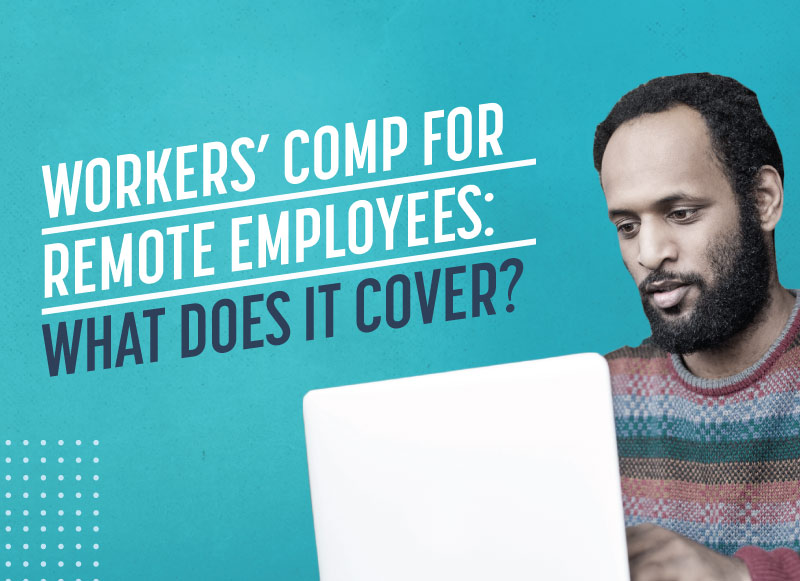Workers’ Comp for Remote Employees—What Does It Cover?
- Published Oct 21, 2021

Businesses have looked very different recently, including how and where employees do their jobs. Remote work, or telecommuting, has become the new normal for businesses of all sizes and in a variety of industries. According to a PwC survey, it appears that working from home is here to stay for many employers.
This shift has led many business owners to wonder if their existing workers’ comp policies cover employees who work at home or if they even need workers’ comp coverage for their remote employees. After all, on-the-job accidents and illnesses can occur anywhere — but is it really the responsibility of the employer if an employee is hurt at home?
Here, we’ll discuss the ins and outs of workers’ comp for remote workers, including what it covers, how it works, and how you can get the coverage you need for your team today.
Workers’ Comp Coverage
First, let’s start with understanding what workers’ compensation is and what it covers. Workers’ comp is a form of (usually mandatory) business insurance that protects businesses and their employees from the financial burdens related to on-the-job injuries or illnesses.
Workers’ comp is legally required by every state in most cases. Although the benefits and coverage of workers’ comp vary by state, generally, workers’ comp provides for the following:
- Medical expenses
- Lost wages
- Legal costs
Having workers’ compensation coverage is beneficial for businesses as well as their employees. Not only does workers’ comp take the place of lawsuits in most states, but medical bills and lost wages add up quickly, and it is comforting to know that neither you nor your employees will be devastated by the costs incurred from a workplace injury.
Are Remote Workers Covered By Workers’ Comp?
In short, yes, most remote workers’ are covered by workers’ compensation insurance policies, so long as their injury or illness occurred as a direct result of the course and scope of employment. This means that — regardless of an employee’s location — if their injury or illness occurred while completing a work-related task during work hours they should be covered. That said, it is especially important in claims related to telecommuting that it is proven that the injury or illness is work-related and would not have happened if not for the direct connection to the work performed. In most cases, tripping over the dog while walking from the home office to the kitchen is not going to count. However, it’s critical that your remote workers’ locations are on your policy. If the state in which they work is not a listed location with your insurance company, you may have a coverage gap.
Luckily, it’s not your job to determine whether or not an employee’s injury or illness is work-related! . It’s simply your job to provide coverage and support for your team so they’re protected. To do that, you have to first ensure you’ve purchased workers’ compensation, and secondly that you’ve advised your insurance company of all your employees’ work locations.
Employers’ Responsibility For Remote Workers
Even though employers do not have control over their remote employees’ work environment, the courts typically do not see this as a sufficient reason to deny claims. Courts see remote employees’ homes as workspaces and, as a result, they view the hazards of the job the same as they would if the employees were working in an office.
That means it’s up to you as an employer to provide a safe working environment — even if your team is working remotely. You can do this in the following ways:
- Create and promote a workplace safety policy specific to telecommuting employees
- Outline home office setups for remote employees that promote safety
- Provide support to help employees maintain a safe work environment
- Keep in touch with employees when possible to ensure their home offices are safe
- Establish work hours, rest breaks, lunch breaks, and off-work hours to further define when an employee is “at work”
Outside of these steps, the best thing you can do to protect your remote employees is to have a workers’ comp policy.
Cerity — Affordable Workers’ Compensation Insurance for Remote Employees
Whether some or all of your team is remote, it’s still important that you protect your employees with workers’ comp insurance. If work-from-home employees experience an injury while working, workers’ compensation insurance can help protect them with much-needed relief as well as protect you from being held liable for the costs associated with their injuries.
We know it’s a lot to think about. That’s why we’re here to help. Cerity has you covered when it comes to workers’ comp for remote employees. We offer a flexible, more affordable approach to workers’ comp coverage.
With Cerity’s free online quote tool, you can get a workers’ comp quote quickly and easily and get protection for your remote workers as soon as the next day. Check out our free online quote tool to get the coverage you need so you can get back to running your business — from wherever you want.
Workers' Comp 101 for Cleaning Businesses: I'm about to go from one employee to several. How does that impact my workers' comp?
Learn more

Grab your free quote today.
It only takes a few minutes, whether you’re already covered or just getting started.